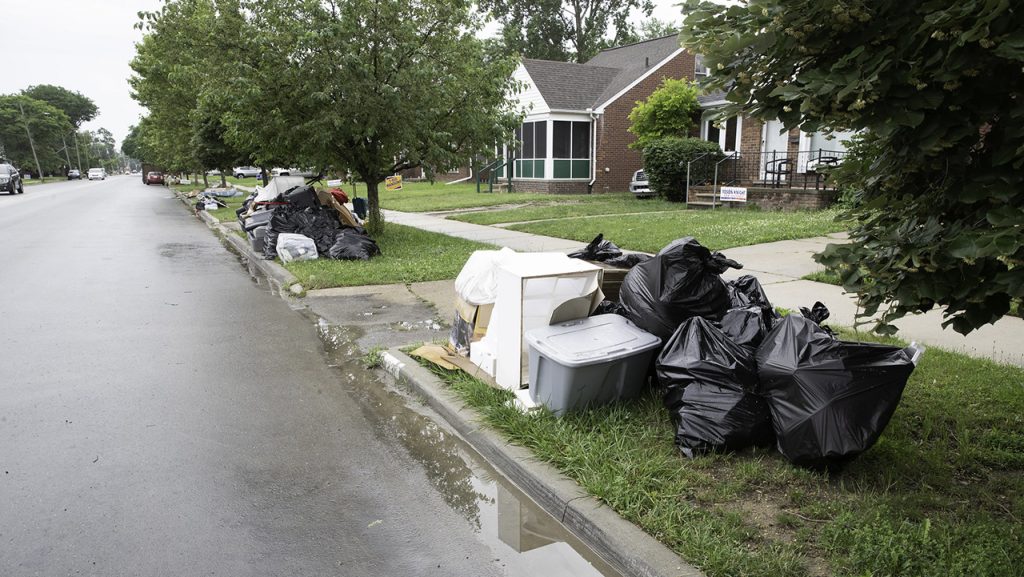The Metro: Contributors and solutions to Detroit’s flooding problem
Sydney Waelchli July 15, 2024Detroit Water and Sewerage Department Director Gary Brown joined the show to discuss some of the ways the department is working to mitigate flooding in the city.

Cleanup efforts after severe flooding in Detroit, June 2021.
Over the past decade, the effects of climate change have led to a major increase in flooding events in cities like Detroit. That’s partly due to climate change, and because the city’s infrastructure is aging.
But, there’s another hidden contributor that’s leading to severe flooding in cities. They are called “ghost streams,” or waterways that previously existed but were either buried underground or filled in to support urban development.
On a recent episode of Created Equal, Stephen Henderson spoke with Jacob Napieralski, a geology professor at the University of Michigan – Dearborn about how “ghost streams” contribute to flooding in Detroit.
But, what are we doing to alleviate severe flooding in the city? And how should residents be prepared to defend against flooded homes and businesses?
To discuss this, Gary Brown, the director of the Detroit Water and Sewerage Department (DWSD), joined The Metro Monday. He talked with host Tia Graham and guest host Vickie Thomas, communications director for the city of Detroit.
Subscribe to The Metro on Apple Podcasts, Spotify, NPR.org or wherever you get your podcasts.
After the storms in 2021 that “devastated 20% of Detroit,” the Great Lakes Water Authority and DWSD took charge to make changes and help prevent flooding. Brown said the Great Lakes Water Authority added new substations, transformers and electrical lines, and got necessary maintenance done on the pumps so the system can mitigate flooding.
“Well, what we can do to mitigate flooding is number one, let’s make sure we have as much capacity in our stores as possible,” Brown said. “So let’s clean them. Let’s get all the tree roots and debris out so that when we have heavy rain, we have at least as much capacity in those lines as possible.”
The DWSD has also helped homeowners in Detroit from flooding by participating in the Basement Backup Protection Program. This program involves DWSD workers to put in a backflow preventer in eligible houses to help prevent basement flooding.
“So that when there’s heavy rain, there will be a flap that will drop down inside of a homeowner’s lateral sewer line and prevent flooding from backing up into those homes,” Brown said. “And so we’ve done more than 400, I believe, homes so far, and we’ve got dollars to do another 3,000.”
DWSD recently received another $14 million to continue the program.
According to Brown, DWSD crews will restart implementing the program in early August. Crews will continue to install backflow preventers and sump pumps to redirect water flow away from the houses.
With heavy rain and storms expected to hit metro Detroit Monday night going into Tuesday, Brown said “I’m always worried” about flooding. However, the water systems are designed to handle 1.67 inches per hour.
Still, Brown says, “make sure that your gutters are clean so that water doesn’t spill over outside the gutter and go down toward the foundation of the house. Please, if you have valuables in your basement, make sure that you remove anything of value that could be damaged.”
Houses with the Basement Backup Preventer installed should not flush the toilet, take a shower, or run the dishwasher during a rain event.
“And just like the water can’t back up into the house while the rain event is going on. It can’t get out of the house either,” Brown said. “And so you want to be cognizant of that. But that’s a pretty good trade off.”
Use the media player above to hear the full interview with Brown.
More headlines from The Metro on July 15, 2024:
- The state plans to build 100,000 public chargers by 2030. Right now, it’s way behind on that goal, as Michigan only has 3,400 public ports. That trend is about to change as Consumers Energy announced last week that it will be facilitating the installation of 1,500 fast-chargers by 2030. Electric vehicle programs director for Consumers Energy, Jeff Myrom, joined The Metro to talk about how they will be doing that and what it means.
- WDET reporters Russ McNamara and Quinn Klinefelter are in Milwaukee this week covering the Republican National Convention. WDET News Director Jerome Vaughn joined The Metro to discuss how Trump’s assassination attempt on Saturday will impact the convention.
Listen to The Metro weekdays from 11 a.m. to noon ET on 101.9 FM and streaming on-demand.
